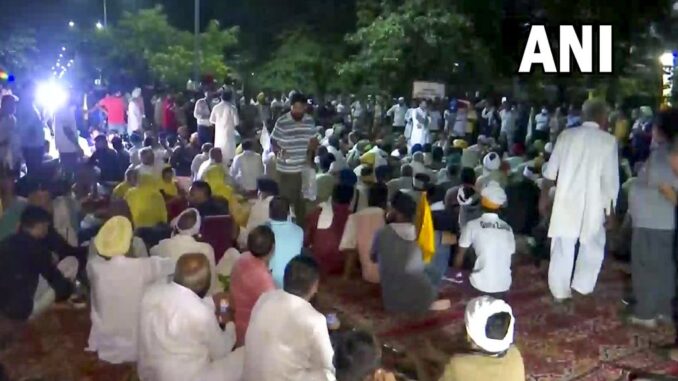
CHANDIGARH, India — The government of the northern Indian state, Haryana, on Sept. 7, extended the temporary suspension of the internet and the short message services for mobile in the Karnal district to prevent any disturbance to the peace and the public order.
The decision came as farmers gathered around the mini secretariat over Aug. 28 lathi-charge incident.
Lathi or baton charge is a coordinated tactic for dispersing crowds of people, usually used by police or military during public order places.
“In exercise of powers under Rule 2 of Temporary Suspension of Telecom Services (Public Emergency or Public Safety) Rules, 2017, I, Home Secretary, Haryana at this moment order for the suspension of the mobile internet and messaging services (excluding banking and mobile recharge),” said the order by the state government, directing all telecom service providers to ensure the compliance.
“This also includes dongle services, etc., provided on mobile networks except for voice calls in district Karnal. The suspension of telecom services will come in effect from 12:00 midnight to 11:59 pm Indian Standard Time on Sept. 8.”
Meanwhile, protesting farmers gathered around the mini secretariat in Karnal to support their demands after the breakdown of talks with the district administration over their call for action against officials allegedly involved in the baton charge on Aug. 28.
They announced that they would continue their sit-in at the mini secretariat till the government talked to them over their demands and accepted them.
“We have captured the gate and want to take some rest. It is up to the government now as to when they want to talk. We are sitting here peacefully till then,” said Rakesh Tikait, the Bharatiya Kisan Union leader.
Farmers breached police barricades as they reached the mini secretariat. Swaraj India, an Indian political party, chief Yogendra Yadav said they would continue their protest till the government accepted their demands.
As per a statement by the state government, District Commissioner Nishant Kumar Yadav, Inspector General of Police Mamta Singh, and Superintendent of Police Gangaram Punia, and other senior officers are still holding talks with the protesters.
Haryana government on Sept. 6 announced the suspension of the internet and messaging services in Karnal, Kurukshetra, Kaithal, Jind, and Panipat districts from 12:30 am Indian Standard Time on Sept. 7.
Haryana had earlier announced a suspension of internet services in only Karnal district but extended it to four adjoining sections later.
In the Karnal district of Haryana, Section 144 of the Criminal Procedure Code has also been put, banning all public assemblies.
Ahead of a Mahapanchayat in Karnal by farmers, Haryana Home Minister Anil Vij requested farmers to protest peacefully. The state machinery is prepared and has made suitable arrangements, including deploying adequate security and creating route diversions.
“Everyone is allowed to raise their voices and to hold peaceful protests in a democracy,” said Vij.
“Tomorrow farmers are planning a protest, they are welcome to do so, ten but the protest should be peaceful and should not cause any hindrance to the public.”
The Samyukta Kisan Morcha, which is heading the farmers’ agitation against three farm laws, has given a call for the gherao (encirclement) of the secretariat.
They have demanded registration of a first information report (FIR) against those officers who had allegedly ordered a lathi charge on agitators during their protest against a Bharatiya Janata Party event in Karnal on Aug. 28.
The protests began Nov. 26, 2020, against three farm laws introduced by the government in September 2020, which purportedly aim to break the monopoly of state government-run marketplaces, allowing farmers to sell directly to private entities.
The farmers believe the move will reduce the authority of state governments as their revenues from the markets will dwindle.
On India’s 72nd Republic Day—Jan. 26— violence erupted between the farmers and the police.
“I was on the tractor near the Karnal bypass, close to the Singhu border [between Delhi and neighboring state Haryana], when the police stopped us,” said Parwinder Singh, a farmer from Ambala, a city in the northern state of Punjab.
Singh was among hundreds of protestors and policemen who were injured in what turned out to be one of the most violent Republic Days in India’s history.
“They [the police] asked us to not go forward, but we had permission from the police,” Singh said.
“When we started going ahead, they baton-charged us. I was injured as well. We had no other option but to retaliate.”
Having failed to dissuade the farmers from organizing their alternate rally, the Delhi Police had ordered them to stick to Delhi’s borders at Singhu, Tikri, and Ghazipur — effectively keeping the rally outside the national capital.
Defying both these orders, the farmers — some on foot while others on their tractors —breached the capital’s barricades.
“The Delhi Police worked in accordance with what was decided with the farmers,” reads the official statement from the Delhi Police.
“The farmers violated the norms and chose the path of violence. We had to take adequate measures to maintain the law-and-order situation in the capital. Many of our personnel were badly injured, and there has been an immense loss to public property.”
(With inputs from ANI)
Edited by Saptak Datta and Ritaban Misra
The post Northern Indian State Extends Ban On Mobile Internet, SMS Services appeared first on Zenger News.
